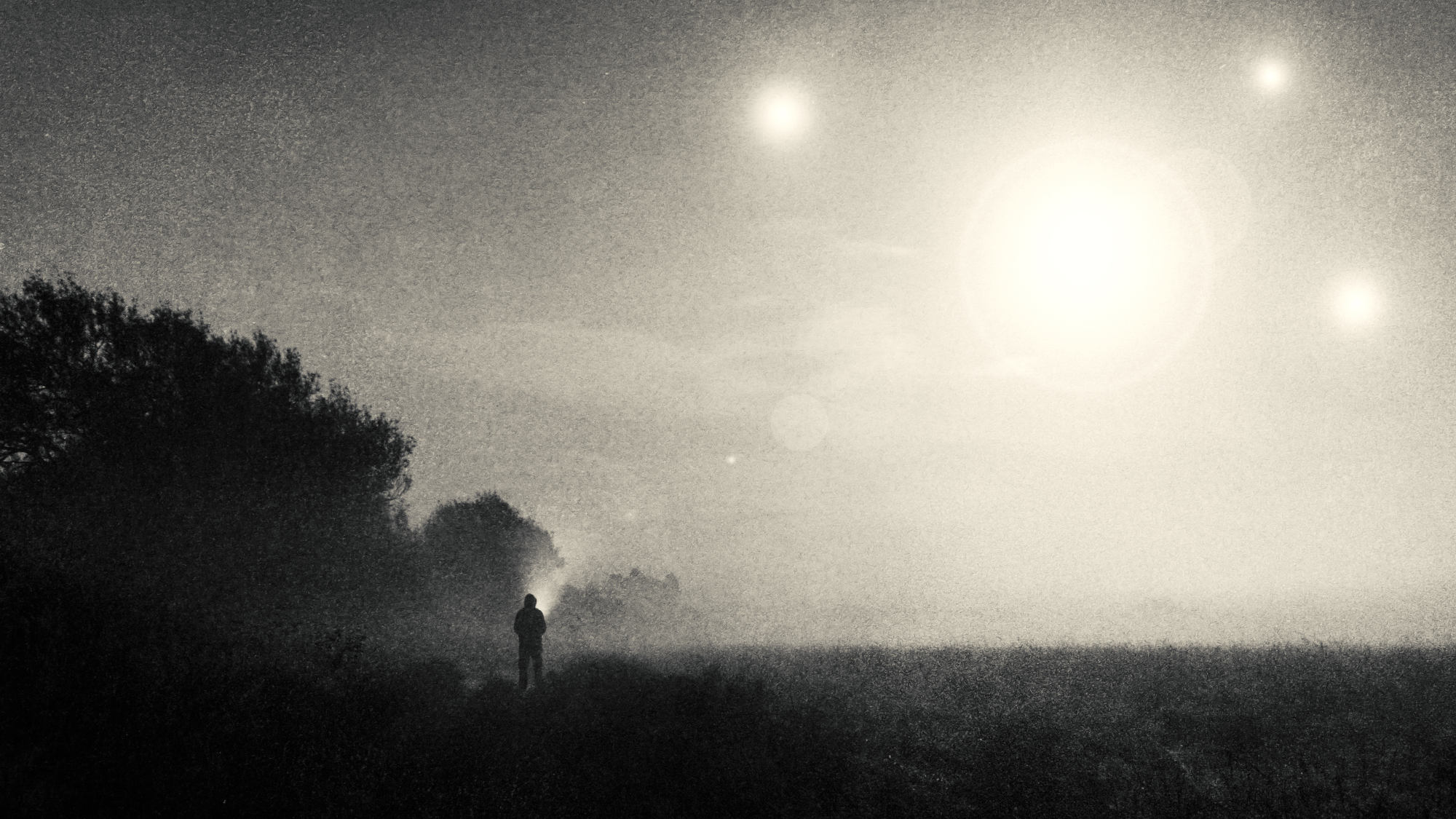
© Dave / Adobe Stock
UFOs – What Do They Reveal About Us?
Not just a topic for conspiracy theorists. What the social sciences can learn from them
Threat and fear, but also fascination and hope – people have conflicting feelings, expectations, and ideas when they think of aliens. The topic is currently receiving a great deal of attention not only in the USA; it is also being researched at the University of Bremen. In his lecture at SCIENCE GOES PUBLIC!, Dr. Christian Peters from the Bremen International Graduate School of Social Sciences (BIGSSS) gives us an insight into what the UFO phenomenon does to us and what earthly insights can be gained from it.
Mr. Peters, your presentation at SCIENCE GOES PUBLIC! stands out due to a rather unusual topic. How is it that everyone is talking about UFOs again?
The interest in the subject never fully went away. People have always seen inexplicable things in the sky, but their sightings have been interpreted differently depending on the time and place. The ‘modern’ UFO theme emerged towards the end of World War II with a hot phase in the late 1940s and early 1950s. The US was in the Cold War with the Soviet Union and the associated arms race and research on the atomic bomb changed the world. Suddenly, science fiction had become reality, which gave rise to discussions about rockets and world destroyers and, of course, about a new era of airspace surveillance. After the Soviet Union launched its first artificial earth satellite, Sputnik, in 1957, humanity was finally on its way into space. One could say that we kept looking further into the sky. The military attempted to record and evaluate the unabated reports of UFO sightings. Officially, the whole thing ended at the end of the 1960s with the so-called Condon Report, which concluded that there was no scientific evidence for flying saucers. But the genie could not be put back in the bottle.
In 2017, New York Times journalists revealed that despite information to the contrary, the US Department of Defense had been running its own UFO program since the early 2000s. Last year, a high-level whistleblower made allegations against the US military that it was actually holding back existing alien technology. There were hearings in the US Congress and in July last year, what is known as the Schumer Amendment even introduced a law dealing with non-human intelligence and technology. Political initiatives also exist in Brazil and Mexico, and even the EU Parliament held a hearing on the subject just last week. Of course, the linchpin of the more serious forays into the Unidentified Anomalous Phenomena or UAP, as UFOs are now known, is the question of national security: Due to the advances in unstaffed aerial technology, but also due to the expansion of private space travel, the sky has recently had more traffic. And not every radar signature can be assigned immediately, so it initially remains unidentified. Voilà. The unidentified flying object. This is of course a major problem for private and military air traffic control and certainly the most politically urgent aspect of the UAP discussion. However, the goal is also to address the question: “What if there really is something weird up there?” And here, too, my colleagues and I are observing a change. Science is more interested in this, media outlets are glad to address it, foundations and societies, databases and tracking apps are emerging that turn mobile phone owners into field researchers.

© Lukas Klose
Where does your interest in the topic come from?
My interest in extraterrestrials – in every way – existed long before I was interested in the social sciences. My fascination with the starry sky began in my teenage years, and my cousin always said that one day I would fall into a hole because my head was in the clouds. I read all the science fiction I could get my hands on, including books on cosmology and astronomy, at least as far as they were understandable. What has always amazed me is that so many people avoid looking deep into the sky. It seems to overwhelm them that everything there is seemingly infinite. That may be why they aren’t so interested in the big questions behind it: Where do we come from? Are we alone in this vastness? If not, what does that mean for us? A simple example of this is that according to the current state of science, the universe is about 13.8 billion years old. In other words, if our theories are correct, then really everything that exists, all matter and energy as well as all laws of nature go back to this initial point in time. But if you ask the people around you how old they think our cosmos is, their answers will astonish you. In any case, questions like these are what motivated me. My childhood wish was to fly to the center of the Milky Way and understand everything. After growing up, it quickly became clear that what is right on our doorstep might raise the more pressing questions. For good reason – this is where society comes into play! Lately, these two spheres have been mingling. This is fun and I get to meet fascinating people. People from the direct vicinity of the White House who themselves claim to have seen UFOs several times, a world-famous astronomer who wants to prove extraterrestrial technological artifacts in the solar system, and a French researcher who is legendary in UFO circles and whom Steven Spielberg memorialized in “Close Encounter of the Third Kind.” They do indeed have exciting things to report.
“So it is never ‘just’ a flying saucer with little gray men in it, but a negotiation point for urgent issues.”
UFOs and social sciences, how do those connect?
Of all disciplines, the social and cultural sciences should actually have the least fear of contact with the subject, since their concern is not to provide explanations for unexplained phenomena, but focus on the human side of the matter. So far, however, not many studies exist; these are just beginning. As a political scientist and therefore also as part of the social sciences, I am interested in processes that have to do with new values or the shifting of old value patterns, also, and especially, in technical and technological fields. The UFO fits well into this. It anticipates a number of upcoming questions, such as those regarding strong AI, if you understand it as a non-human actor that societies will react to – and already do. However, the UFO also serves as a projection screen for expectations of salvation and fears of technological change. So it is never “just” a flying saucer with little gray men in it, but a negotiation point for urgent issues. For example, my stance is that the idea of a superior alien civilization casts a glimpse into a future in which humanity has been able to prove itself despite all ecological crises. If there are UFOs, the idea is, it must be possible to survive as a technology-enabled species. This is a trivial thought, but also a very powerful one given the sad present. And I think that’s what makes the topic so appealing. Maybe it’s even about inspiration. From my point of view, we should therefore ask ourselves why so many people jump on this topic, why it is gaining political relevance right now, and what expectations, hopes, and values are associated with it. To put it bluntly: Perhaps in the future, the political circus will no longer just be about left and right, but also about up and down, about space or Earth.
What is the phenomenon doing to us as a society now?
As I said, I am convinced that people associate a variety of expectations and hopes, but also fears and challenges with this topic. C. G. Jung, the founder of analytical psychology, described the UFO as a modern myth in the making in a small booklet from 1958. The UFO reflects the human need for a deep meaning and a history of salvation in a contemporary, technological form that can no longer be sufficiently satisfied in the knowledge-based society. I myself am currently exploring the extent to which certain forms of the UFO narrative reflect the growing distrust of Western societies towards their governments. Within this realm, there are many conspiracy theories, many doubts about science and the political system. On the other hand, however, one can also observe a remarkable lack of transparency on the part of the state authorities. I believe that there is still a deep and ultimately irrational taboo around thinking about the existence and presence of extraterrestrial intelligence. I would emphasize the importance of reflection. Not to reject the idea outright, but to consider it possible and to play with it intellectually, to let it become a counterfactual hypothesis that may even help us with very tangible questions. Why would extraterrestrial intelligence be weird? Science shows us every day that the probability of life in the universe is high. And if this life had enough time, why wouldn’t it become as intelligent as we are? Or if it had even more time, perhaps millions of years, why wouldn’t it be more intelligent than we are? And with this intelligence, the cosmic distances between the stars may not seem much further than a transatlantic flight to us. From that perspective, it is interesting to wonder how much transparency and openness a world power could allow itself if there were concrete evidence of a non-human technological civilization, regardless of how far away. There would be little room for openness, I suspect – and not without reason, if the world power wants to retain control.
What can the visitors of your lecture look forward to?
You can look forward to some unconventional thoughts on the subject. Many people associate UFOs with tin foil hats or science fiction, but perhaps the topic will seem more plausible to them in other ways after the lecture. I am definitely looking forward to many questions from the audience and a lively discussion.
Are you interested in talking about UFOs in the pub?
If you would like to learn more about this topic, you can meet Dr. Christian Peters in the Haifischbecken pub at SCIENCE GOES PUBLIC! on April 18, 2024. His “Social Science in the Sky: What Do UFOs Tell Us about Ourselves and Our Future?” lecture begins at 8:30 p.m. The SCIENCE GOES PUBLIC! event series takes place from March 14 to April 18, 2024. In a cozy pub atmosphere, scientists give 30-minute easy-to-understand lectures on what they are currently researching and working on. All information and dates for the free science lectures in Bremen and Bremerhaven can be found on the SCIENCE GOES PUBLIC! website (in German only).